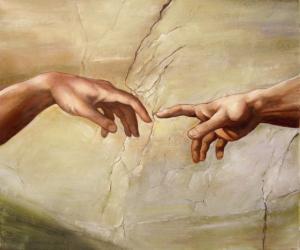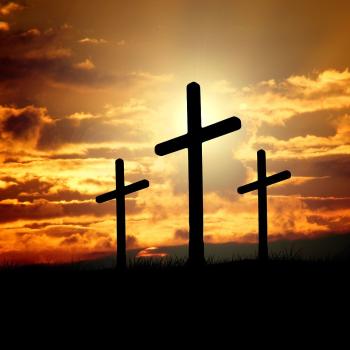
Part 1 – The Garden of Eden
Let’s be honest; the Bible can get a bit confusing when it comes to the nature of God. For instance, the kindness we see in Jesus is absent under Hebrew Law. Does God forgive us freely, as the New Testament teaches, or does he insist we are stoned to death for the picking up of sticks on the Sabbath, as he did in events described in Numbers 15?
In this series, my intention is to cut through all the confusion and present four clear periods of differing divine behaviour in the Old and New Testaments: the Garden of Eden, the time of Noah, Hebrew Law, and the life of Jesus (and beyond). I’m hoping to give clear, Biblically demonstrable reasons for the differences between those periods, and point the way to the true nature of God, along with what we can expect from him today. First, the Garden of Eden.
First things first – I’m not invested in arguments about whether the creation story was literal or not. I have an opinion, but it’s not something that is dear to me, as I believe the message of the account is the same, whether treated as literal or allegorical. It’s the message that captures my attention, and which I will be focussing upon.
Adam and Eve (whether historical figures or an allegory of humanity) walked with God. They knew his companionship, enjoyed an effortless connection with him, had no experience of suffering and lived in peace and abundance. It’s worth bearing in mind that this was one of only three Biblical periods in which the will of God was perfectly performed and fully manifest – Eden, the life of Jesus, and in Heaven. These three periods have much in common. In both Heaven and Eden, death (both physical and spiritual), pain, sorrow and suffering are absent. This rather reminds me of one of the descriptions of Heaven in Revelation (chapter 21, 3b-4):
‘Behold, the tabernacle of God is with men, and He will dwell with them, and they shall be His people. God Himself will be with them and be their God. And God will wipe away every tear from their eyes; there shall be no more death, nor sorrow, nor crying. There shall be no more pain, for the former things have passed away.’
In the ministry of Jesus, he spent much of his time relieving suffering – forgiving sin, healing sick bodies, even raising folk from the dead. Pain, suffering and death are not part of the express will of God. They are not built into our eternal destiny. Indeed, it is their absence that marks the will of God being perfectly performed. That said, we live in the Vale of Tears, and while we endure this life, we unavoidably experience these corrosive, twisted forces, but it is important to remember that they are not from God, nor an expression of the will of God. He does everything he can to lead, heal and restore us while we are here on Earth, but only in the Hereafter will that healing be complete.
So Adam and Eve lived in perfect communion with God, but there always has to be a choice for beings made in God’s image. Free will is fundamental to who we are, and perhaps the highest honour we are accorded with. Adam and Eve’s choice revolved around whether or not to eat of the Tree of the Knowledge of Good and Evil. They understood that eating the fruit of that tree would change them – they believed they would be like God, who also understood the nature of good and evil. They knew it was a departure from innocence, but they ate the fruit anyway.
As a young Christian, my understanding was that God was angry with them for breaking the rules, punitively cursed and then kicked out of Eden for rebellion. However, if we look at the transformation they underwent after eating the fruit, and the ongoing events once the pivotal moment had come and gone, I believe we can perceive a kinder, truer story.
Adam and Eve were warped by the knowledge and good and evil – instantly and permanently – but what might that knowledge be? I believe their behaviour shows us the nature of the knowledge they gained. In particular, their first response demonstrates the depths of the dark transformation they had gone through. For the first time, they knew and embraced shame, covering their nakedness and hiding from God. In other words, they gained another perspective on themselves – one that measures their goodness or lack of it, and pronounces judgement. The first thing they did with the knowledge of good and evil was to judge themselves evil.
The shame they knew stemmed from illusory knowledge, which causes people to measure themselves against a standard. They regarded their bodies and knew the rejection of the self, down to their physical forms. In those moments Adam and Eve felt they didn’t fit, that something was fundamentally wrong with them, that they weren’t good enough, and this led them to fear. In concert with this they decided the God they knew and walked with was someone to be afraid of, which means they judged God too. Their perspective on God and themselves had changed, and not for the better. This was the Great Plummet of the human race.
The knowledge of good and evil can therefore be summed up in a single word – judgement. They made themselves judges of their own worthiness, but only God can judge, because only God knows the motives of the heart (1 Cor 4, 5):
‘Therefore judge nothing before the appointed time; wait until the Lord comes. He will bring to light what is hidden in darkness and will expose the motives of the heart.’
We can’t even accurately measure the motivations of our own hearts. In 1 Cor 4, 3-4, Paul explains why he doesn’t judge himself (positively or negatively):
‘I care very little if I am judged by you or by any human court; indeed, I do not even judge myself. My conscience is clear, but that does not make me innocent. It is the Lord who judges me.’
It is the Lord who judges us, because only he knows the motives of the heart, and when we judge either ourselves or others, we raise ourselves to the level of the Almighty, as Adam and Eve did when they chose the knowledge of good and evil. The instant result was that they were swift to judge both themselves and God, and embraced shame like a cloak. Humanity had fallen so very far.
This sheds a light on the curse and the banishment. My belief is that the curse was not a punishment. Rather, humankind had been given both dominion and stewardship of the natural realm, and in humanity’s fall, nature fell too. The curse was the unavoidable consequence of the fall – the outworking of spiritual death in the natural realm, including in Adam and Eve’s bodies, as part of that natural realm. The ground became hard to work, childbirth became painful, relationships became fractured, and humanity became subject to the aging process, death and decay. Paul writes of this in Romans 8, 19-22:
‘For the creation waits in eager expectation for the children of God to be revealed. For the creation was subjected to frustration, not by its own choice, but by the will of the one who subjected it, in hope that the creation itself will be liberated from its bondage to decay and brought into the freedom and glory of the children of God.
We know that the whole creation has been groaning as in the pains of childbirth right up to the present time.’
Because of the fall, creation is subject to decay and bondage, just as we are, and groans for its restoration, when we, the children of God, are fully and finally restored. Our connection with the natural world, and our spiritual and physical influence over it, is absolute. The curse will finally be undone when the children of God enter their freedom and glory.
I’ve fully abandoned, then, the belief that the curse was a tailored punishment that expressed the heart and will of God. Indeed, the perspective of God can be seen in the way he responded to their tragic transformation.
Instead of judging or killing them (as we would expect under the Hebrew Law), God slaughtered an animal and covered them with its skins. He had compassion on them, understanding they now knew shame and had turned on themselves. He didn’t point the finger or berate them, but mercifully dealt with their immediate problem. This slaughtering of an animal for its skin was a symbol of Christ, who too would be slain to cover sin – the sin of the whole world. It was a promise to send his Son, a guarantee of forgiveness, a sure sign that the great plummet would one day be reversed, and this time there would be no pit to fall into, because righteousness will be established forever through the blood of Jesus (Hebrews 9, 22b).
‘For there is no forgiveness without the shedding of blood.’
God didn’t judge Adam and Eve – he clothed them, and kicking them out of Eden was a mercy. To live forever in such a broken, twisted state would be excruciating – the ultimate punishment, a manifestation of Hell. God banished us from perfection for our sake, planning to bring us back when the time was right, through Jesus.
This is the God we see in Eden – companionable, gracious, choosing not to judge, protecting us from ourselves and already planning an eternal solution. Whether we see the story as allegorical or historical, that is the message I take from it. It is easy, I think, for the modern-day believer to relate to the God we see in Eden, because his actions and attitude towards us line up with the compassion we see in the life of Jesus.
But here’s the rub. In Noah’s time, God judges the whole world by a flood (again, whether allegorical or literal, the meaning remains the same). And as mentioned above, in the time of Moses, punishments for breaking the Hebrew Law were swift and severe. For example, Numbers 15, 32-36:
‘While the Israelites were in the wilderness, a man was found gathering wood on the Sabbath day. Those who found him gathering wood brought him to Moses and Aaron and the whole assembly, and they kept him in custody, because it was not clear what should be done to him. Then the Lord said to Moses, ‘The man must die. The whole assembly must stone him outside the camp.’ So the assembly took him outside the camp and stoned him to death, as the Lord commanded Moses.’
This was not a human interpretation of a divine command; it was the Lord’s, and that raises a difficult question: if picking up sticks earned stoning and death, why didn’t God kill Adam and Eve? Why did he continue to remain a companion and talk with them, after their banishment from Eden? Why didn’t he go straight to judgement, as he did under Hebrew Law? Because going straight to judgement is not the nature of God, despite what we see in Numbers. King David, who despite living under the strictures of Hebrew Law, understood the true nature of God (Psalm 148, 8-9):
‘The Lord is gracious and full of compassion,
Slow to anger and great in mercy.
The Lord is good to all,
And His tender mercies are over all His works.’
Slow to anger. Sometimes I dwell on that at length, because it is in such contrast to the heavy and vengeful image of God I once held. God is slow to anger, and not only that – he is great in mercy. The Lord has chosen to express his greatness through mercy, rather than anger.
This is the God we serve, and certainly the God Adam and Eve knew, but how do we explain Noah’s flood, or God’s actions under Hebrew Law? If the Lord is slow to anger, why does a man picking up sticks on the Sabbath have to be stoned to death, with no second chance? If we don’t resolve these difficult questions, we are left with unavoidable cognitive dissonance, especially when we approach God. How do we know which version of himself we will encounter, when we seek grace and mercy? Why would we even pray, if the outcome is a lottery?
Next time, I’ll be examining Noah’s flood, why God did not act in keeping with the merciful nature during that period, and how that fits into the grand scheme of human and divine interaction. If readers wish to explore this first part in more depth, I delivered a talk on the subject during lockdown, which can be found here. Please excuse the poor video quality!












